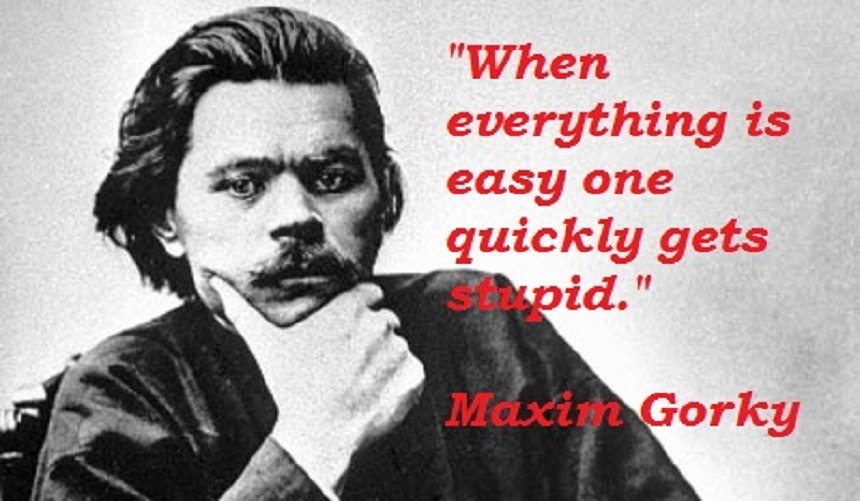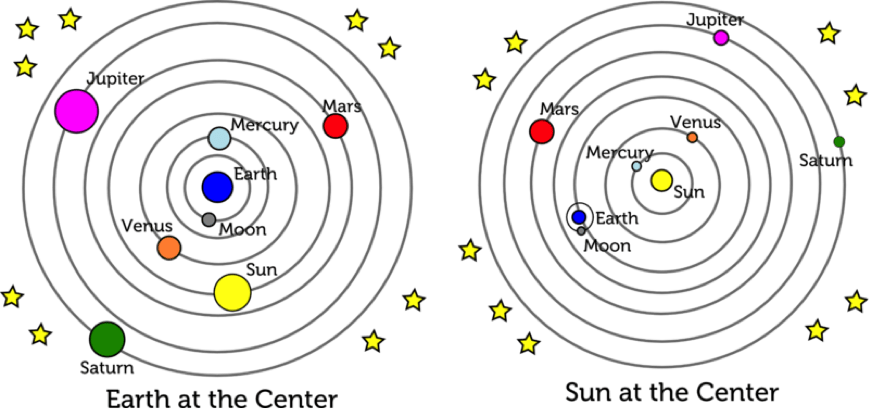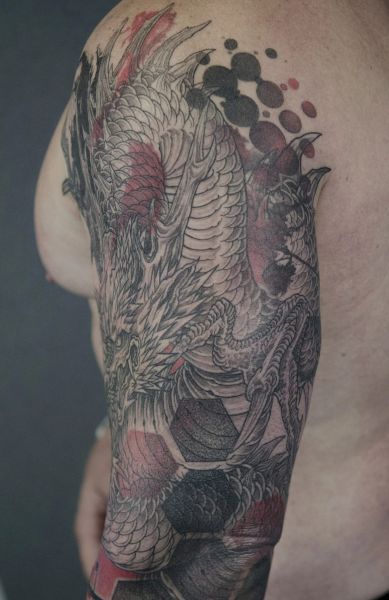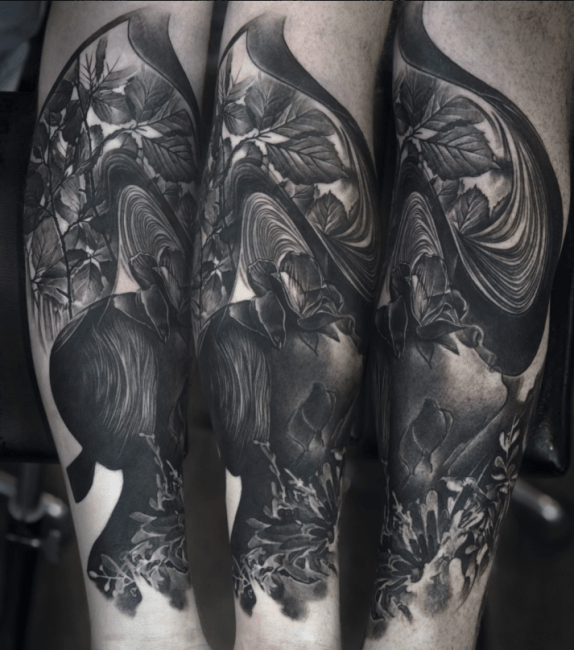Maxim Gorky is one of the most important artistic and intellectual figures associated to Russian Revolution of 1917. He remained, throughout the life of the Soviet Union, a symbol of the Revolution and was a revolutionary artist image. But to what extent was he agreed with the views of Lenin and the entire Soviet experiment? Less than we think.
In the range of portraits of Soviet heroes idolized in all soviet schools and libraries, Maxim Gorky was always the one who had the honor of being placed next to Lenin. That’s because Gorky was a symbol of Soviet culture was considered the first great writer of the Russian proletariat, a lifelong friend of the Bolsheviks and founder of socialist realism, artistic doctrine of the regime.
Cult of Maxim Gorky was born during his lifetime, when they made several films about his youth. At that time, the main street in Moscow received its name, and his hometown was renamed Gorky.
But there was also another Gorky, the man behind the myth that the Soviet public was not allowed to know. Currently, the opening of Soviet archives revealed a figure much more complex and tragic than that shown in the collections of his censored work.
From his work in journalism, long known in the West, and the rich correspondence buried in the archives, it is clear that Maxim Gorky was not the most faithful of the Bolsheviks, he had doubts about the revolution and direction regime after 1917 pushed him in exile four years later,where returns until 1928, only to become a prisoner of the Stalinist regime that he did not supported it.
Gorky and Lenin: the artist and the revolutionary
Gorky knows Lenin in 1902. He was then 34 years old and was already known in the marxist circles of the intelligentsia in Petersburg. He was the first quality writer who left the urban world of the proletariat, of thieves and vagabonds.
Therefore working class was very easy to identify with Gorky’s stories because they stemmed from their daily life and captured the spirit of defiance and rebellion that characterized this world.
Gorky used the money received from writing to fund the social democrats, but its relations with the Bolshevik wing of the party, especially its leader was never very clear.
As with other intellectuals, Gorky’s commitment to revolution was romantic and idealist. He saw the revolution of the human spirit fighting for freedom, brotherhood and spiritual progress. He had a predominantly humanist vision, which was centered individual, which is why he could never accept the iron discipline or narrow dogmatism of the Bolsheviks.
Therefore, he never joined formally, and the characters of his stories were fighting for freedom and dignity in their own way, but were not part of an organized proletariat.
Although Gorky loved Lenin for his intellect, for charismatic leadership and personal charm, he despised how the Bolshevik leader try to compress the diversity of human life in his abstract theories. Together with Bogdanov and Lunacharsky, two other cultural theorists of Russian Social Democrats, Gorky had a confrontation with Lenin in 1910-1911, when the three met with workers at his villa on the island of Capri, where they were trying to educate them. Lenin did not recognized the potential of workers as independent cultural force and emphasize their role within the discipline of the Party.
But Gorky and his colleagues believed that cultural and spiritual advancement of the working class must become the guiding force of the revolution. For them, marxism was a form of religion, the humanity in place of the Supreme Being and the collectivism instead of the Holy Spirit, theme further developed by Gorky in Confession, the novel hero, Matt discovers God through fellowship.
The rejection of revolutionary violence
The emphasis that Gorky puts on civilizing mission of the revolution brought into conflict with Bolsheviks in 1917. He accused them of being awakened the mob violence, which, he believed, could throw Russia into a new dark age of barbaric chaos.
February Revolution unleashed a wave of anger and desire for revenge against all things associated with the old regime: crowd attacking prisons, police stations, destroying old statues and emblems tsarist, palaces and bookshops vandalized.
Gorky was a direct witness of this destruction, which he repeatedly condemned in the release of his articles from 1917 to 1918. In his opinion, there was no social revolution, because you could not detect any spiritual advance in violence on the streets, in the development of anti-semitism or royal pornography (stories about Rasputin and the Empress) that followed the collapse of the regime. What people called the revolution, said Gorky, was nothing more than an outbreak of “zoological instincts,” dark and ancient hatred of society, aroused by the violence of war and the Bolshevik rhetoric, which threatened to destroy the Russian civilization crumble.
Gorky’s pessimism flowed from the perspective of a books man disgusted of violence in all its forms. He judged revolution after how it corresponded to his own humanistic ideals. But Gorky’s voice did not have the necessary strength to be heard.
Leftist intelligentsia accepted that violence was a natural impulse of people oppressed and was justified in terms of larger goals of the revolution. Some even believed that complete destruction of the old Russia could be a form of exorcism of the sinner past, from which a new better world could be born.
For Gorky, however, the sword was the sword, violence was violence and nothing more. In a speech written for the anniversary of the February Revolution (unpublished at the time!), He wrote the following:
A revolution is only a revolution when it arises as a natural and powerful expression of the peoples creative force. If, however, the revolution is simply a release of the instincts of the people accumulated through slavery and oppression, then it is not a revolution but just a riot of malice and hatred; it is incapable of changing our lives but can only lead to bitterness and evil.
Can we really say that one year after the Russian revolution, the people have become better, kinder more intelligent, and more honest? No, no one could say that. We are still living as we lived under the monarchy, with the same customs, the same prejudices, the same stupidity and the same filth.
The greed and the malice which were inculcated in us by the old regime are still within us. People are still robbing and cheating one another, as they have always robbed and cheated one another. The new bureaucrats take bribes just like the old ones did, and they treat the people with even more rudeness and contempt.
Gorky, the intellectuals savior
Gorky believed that only the intelligentsia could save the revolution as civilizing and constructive force. During the Civil War, used his ties with the Bolsheviks to save many intellectuals from famine and persecution. He founded a writers retreat in Petrograd, then set up a House of Artists. Also, Gorky and established his own publishing house to print editions of the classics table, helping writers, journalists, academics, artists, whom he hired as editors and translators. It was rather a charity, not a business.
Anti-Bolshevik intelligentsia accused Gorky of hypocrisy. For them, Gorki pictured in people’s champion and the intelligentsia while supporting them, in fact, their oppressors. But the truth is more complicated. Indeed, Gorki enjoied a privileged position within the regime, but at the same time, he tried to use
those political influence to moderate the bolsheviks and to save as many people.
What forced Gorky into exile?
But until 1921, this precarious balance had become untenable. The sailors revolt suppresion from Kronstadt, which the writer claimed, demonstrated that Bolsheviks would not deviate from violent dictatorship, despite protests from old fans. Red terror continues unabated, culminating in the spectacle of the Revolutionary Socialist Party (which included Gorky’s wife).
At that time, Gorky bombard Bolsheviks with increasingly tougher letters. The main target of his anger was Zinoviev, head of the Petrograd party who ordered the arrest of dozens of intellectuals in the city, and Gorky’s supervision. Death of two great poets Blok and Gumilev, 1921, was still a blow to relations between Gorky and Bolsheviks, because the conditions in which they died: Blok’s suffering from a mysterious illness and forbidden to leave to Finland for treatment (by order of Zinoviev) and Gumilev was arrested by the Cheka and shot without trial for alleged involvement in a monarchist conspiracy.
Straw that broke the camel has been famine in the early 20s and the regime’s attitude towards it. Caused, mainly, by agricultural policy of the bolsheviks and excessive confiscation of peasants products, famine affected millions of people in the Volga-Ural region in 1921.
Gorky and other public figures have called on the West for aid, received from the US through the American Relief Administration, but many of those who participated in this appeal were subsequently arrested. After this story, Gorky finally decide to go abroad, something that Lenin advised him to do for some time, theoretical because health care of the writer, but probably because he was tired of criticism which he brought to government. Gorky becomes the first of a long series of writers dissidents forced into exile by the Soviet regime.
Exile drama
For Gorky the exile was a torture. Although no longer bear to live in Soviet Russia, he could not live elsewhere. For many years he traveled through Europe, suffering after Russia, and settled finally in Italy at Sorrento.
In the 20s, what kept Gorky in exile was not necessarily the nature of the Soviet regime as its hostile policy to arts and the new attitude towards the peasantry (the NEP). Though always opposed the dictatorship of the bolsheviks, Gorky found finally a way to justify it, as a necessary antidote to the peasantry instinctive anarchism.
His attitude to the soviet regime took shape better after Lenin’s death, which Gorky regretted deeply. But the writer was still not ready to return to Russia, perhaps fearing of what he would find there. Also stopped him the attachment to the principles of freedom and human dignity, as well as his artistic career success now depended of the freedom and comfort of the West.
Meanwhile, in Russia, the soviet regime had made a list of counter-revolutionary books which had to be banned and removed from bookstores (list which included works by Plato, Nietzsche and Tolstoy). Gorky was then deeply outraged and wrote a letter to the Kremlin leadership that he renounced at soviet citizenship (but he destroyed it in anger).
Soviet russia, the lesser evil?
Finally, the traditional Russian nationalism was the one who convinced Gorky to return home. He could not bear the Russian immigrants, and they could not stand him. The more these emigrants became more anti-soviet, the more Gorky got closer to the regime in the USSR.
Then the progress of fascism in Italy made Gorky to abandon its previous ideals that had formed the basis of opposition to Bolshevik, ideals of Europe as historical force of moral progress and civilization. The more disillusioned by the fascist Europe, the more he was inclined to see in Soviet Russia a higher morall system. Obviously, Gorky was doing no more than
to deceive himself, but in the context of the time we can understand, to some extent, its logic.
So, Gorky returned to Russia in 1928 and finally restored there in 1932. In his anti-western propaganda, the Kremlin has shown the returning of writer as a great victory.
The prodigal son was welcomed in Russia with honors, thereby laying the foundations of Gorky cult. All these things were obviously made to win his support.
Gorky, caught in the fight for power
The Soviet regime that Gorky returned was then divided from Stalin’s supporters and right-wing supporters, including Bukharin, Rîkov or Tomsk, who opposed Stalin’s policy of collectivization and industrialization. I
n this battle, Gorky was found caught in the middle. On one hand, he saw the harsh policy of Stalin only way that Russia could sever the retarded peasant past , but on the other hand, did not appreciate Stalin personally (and was a friend of Bukharin and Rîkov) and opposed its policy on literature. What emerges from poor sources that we have available, it appears that between 1928 and 1932, Gorky supported to some extent on Stalin, while trying to restrain his extremist policies. It was the same game that was played with Lenin in 1917-1921.
Thus, Gorki manages to obtain the release of many people in labor camps and, it seems, would have persuaded Stalin to write the famous article through the leader condemned officials regime excesses during the first campaign of collectivisation.
For his old comrades, who completely break apart from Soviet Russia, Gorky’s return to Moscow was a betrayal. Socialist Victor Serge described the writer as a tragic figure, an open critic of the soviet regime which somehow allowed to be silenced. But the truth was more complex, and in this lies the tragedy of Gorky.
Shortly after his return in 1932, Gorky began to believe that he had done, perhaps, a mistake. He opposed the soviet regime, yet he could not escape from it. Everywhere he went, the public adored him, but he felt a prisoner of this adulation. However, he felt that he can not run again. In addition, the sales of his books in the West had declined drastically, so that he was now financially dependent of the soviet regime. And, not least, Stalin would never allowed him to go abroad again.
Masked critics of the regime
In the last years of his virtual imprisonment in Soviet Russia, Gorky became a kind of thorn in Stalin’s rib. The writer was opposing to Stalin’s personality cult and found the courage to refuse the task of writing a hagiographic portrait of the soviet leader (as he had done once for Lenin).
In Gorky’s public writings, reading between the lines, we detect some cynicism on stalinist regime – his essays against fascism, for example, can be read as a condemnation of all forms of totalitarianism, and in his private writings is clear the disdain for Stalin . After his death, was found a notebook in which Gorky compare him with “a flea monster” that “propaganda and fear hypnosis have increased to incredible proportions”.
Did Stalin ordered the murder of Gorky?
There is evidence suggesting that, in 1934, Gorky was involved in a plot against Stalin with Rîkov, Bukharin, Yagoda and Kirov. If true, then this explains the murder of Gorky’s son that year, certainly on the orders of Stalin, because he would have played the role of messenger between his father and Kirov. So might explain the death of Kirov, assassinated in the same year, and even the death of the writer.
The circumstances of Gorky death remain a mystery. His health was getting worse for several years; in addition to the old problem of the lungs, the writer suffered from heart and chronic flu.
Maxim Gorky dies, finally, on June 17, 1936, and those who have been there in those days said that he died of natural causes. But two years later, during the trial show in March 1938, two of Gorky’s doctors were found guilty of his death (by administering fatal doses of medication errors) on the orders of Yagoda, as part of a “conspiracy against Soviet power “which included Bukharin and Rîkov.
It is possible that Stalin simply used the natural death of the writer as a pretext to destroy his enemies. But we can not ignore the fact that Gorky’s death took place in the right time for Stalin, at two before the Zinoviev-Kamenev trial, that the writer intended to expose it as a lie.
Years later, it saids that doctors who carried Gorky’s autopsy found traces of poison in the body. And in 1963, his widow said she was convinced that her husband had been murdered. Today, many Russians are of the same opinion.
Gorky was buried with state honors, and Stalin himself led the funeral march. After a march through Red Square in Moscow, the great writer ashes placed in a niche in the Kremlin wall behind Lenin’s Mausoleum, thus becoming part of the Soviet regime.
Gorky was buried with full Soviet honors, with Stalin himself leading the funeral procession. There WAS a march in Red Square and paste the writer’s ashes Were
Placed in a niche in the Kremlin wall behind the Lenin Mausoleum. Amaranthus Gorky Became a Stalinist Institution.








